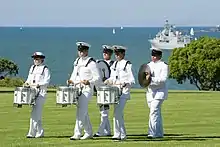Royal New Zealand Navy Band
The Royal New Zealand Navy Band is the musical arm of the Royal New Zealand Navy, serving its musical needs from its headquarters at HMNZS Philomel on Devonport Naval Base, North Shore City, Auckland.
| Royal New Zealand Navy Band (RNZN Band) | |
|---|---|
.jpg.webp) The band in February 2011. | |
| Active | 1959–present |
| Country | |
| Branch | |
| Type | Military band |
| Role | public duties |
| Size | 32 |
| Part of | HMNZS Philomel |
| Headquarters | Devonport Naval Base, Auckland |
| Nickname(s) | RNZN Band |
| March | Heart of Oak |
| Commanders | |
| Director of Music | Lieutenant Commander Michael Dowrick (since 2016)[1] |
It is a 32-member band that consists of the following ensembles:
- Concert Band
- Parade Band
- Big Band
- Jazz Combo
- Rock Band
- Brass Quintet/Brass Ensemble
- Saxophon Ensemble
- Dixie Band
- Pipes and Drums Club[2]
History
History of New Zealand Navy Bands
Bands from the Royal Marines have served with the RNZN for over 36 years, with the first band arriving for service with the New Zealand Division of the Royal Navy aboard the HMS Dunedin in 1924. They often also served in military police roled when off duty. During most of the Second World War, the HMS Achilles and HMS Leander maintained marine bands with twelve men each. By 1944, with the decommissioning of Leander from RNZN service and Achilles in refit, only one ship contained a band, with the one it had consisting of fifteen musicians from the RM. Post-1945 there was one Royal Marine detachment and band that served aboard the cruiser HMNZS Bellona that arrived in 1946 for service.
RNZN Band
The detachment left on 27 November 1951, but the band remained in New Zealand to serve as the official RNZN band, being was elevated to the status of an class A band under the command of a commissioned bandmaster the following year. In 1953 the band was transferred to HMNZS Philomel from Bellona and was designated as the New Zealand Station Royal Marines Band under the command of the Naval Officer in Charge, Auckland, becoming the representative band of the RNZN instead of a single ship. Duties included participating in a full-scale version of The Mikado staged by HMNZS Irrirangi, concerts around New Zealand, and the 1953 Presentation of the Queen's Colour of the RNZN by Queen Elizabeth II. During the 1953-54 Royal Tour of New Zealand, the band was posted to the cruiser HMNZS Black Prince that accompanied the Royal Yacht.[3][4] In 1959 approval was given for the formation of the RNZN Band by the Naval Board to replace the New Zealand Division Marine Band when their service in the country ended. On 20 March 1960, a service was held for the band at the Chapel of St Christopher. A plaque of the crest of the City of Auckland was presented to the bandmaster Lieutenant C.G. McLean. The band was formally discharged from New Zealand service on 6 April 1960. In 2012, it was one of three bands spared in the government cutback on military bands.[5]
The band today

The band maintains a regular schedule of public duties in Auckland, the largest city in the country. Its rehearsal space at HMNZS Philonel is known as the "Narrow Neck".[6] The band has toured and performed at concerts and military tattoos in countries such as South Korea, Japan, Tonga, Canada, the United Kingdom, and the United States.[7][8]
See also
References
- "Royal New Zealand Navy Band to mark Remembrance Day". RNZ. October 30, 2019.
- "Royal Marine Bands in New Zealand Service". December 16, 2015.
- "2. – Brass and pipe bands – Te Ara Encyclopedia of New Zealand". Teara.govt.nz. Retrieved 2020-01-18.
- isaac.davison@nzherald.co.nz @isaac_davison, Isaac Davison Social Issues Reporter, NZ Herald (April 26, 2012). "Scrapping of military bands a 'national scandal'" – via www.nzherald.co.nz.
- "Classical Expressions 2020: Royal New Zealand Navy Band". Stuff Events.
- "About Royal New Zealand Navy Band". www.neighbourly.co.nz.
